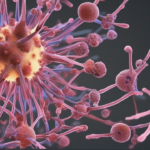The emergence of new variants of the coronavirus, known as “FLiRT”, has raised concern among experts, despite the decline in cases and deaths. These variants, which have become dominant in the US, are believed to be highly transmissible and could lead to a summer surge as more Americans gather for vacation.
FLiRT variants are new strains of COVID-19 that begin with KP or JN, named for the set of mutations that each has independently acquired. They are descendants of the JN.1 variant, a branch of omicron, which made up the majority of cases in the United States in December and earlier this year. FLiRT variants have two additional mutations in their spike proteins, which some experts believe may allow them to evade people's immunity more effectively. However, current data suggest that these strains are no more severe than the previous ones.
A variant of FLiRT called KP.2 is the dominant strain in the US, accounting for 28.2% of cases in the two-week period ending May 11. Another FLiRT variant, KP.1.1, accounted for more than 7% of cases. Because of their potential to evade immunity, there is concern that these variants could lead to an increase in cases as people gather for the summer holidays.
Despite those concerns, cases and deaths in the U.S. have declined by 0.1% and 14.3% respectively, although hospitalizations have increased by more than 9% since March. Early data suggest that KP.2 may be highly transmissible because of its two new mutations, which not only aid transmission but also bypass some of the preexisting immunity in the population.
The symptoms of the FLiRT variants do not appear to be different or worse than the previous strains. The most common symptoms include breathing problems, fever, vomiting, diarrhea, body aches, fatigue, headaches, and loss of taste or smell.
Because the FLiRT variants are descendants of omicron, it is believed that the most up-to-date monovalent COVID-19 vaccines, which target omicron strains, should offer some protection against these variants. The Food and Drug Administration's vaccine advisory committee has postponed its meeting to discuss new recommendations for COVID-19 vaccines until June 5, to allow more time to obtain surveillance data and other information.
The World Health Organization has encouraged countries to create new monovalent vaccines that target the JN.1 lineage, suggesting that new vaccines in the United States may offer more protection against FLiRT variants before an anticipated surge of respiratory diseases this autumn and winter. FLiRT variants have been reported in several countries, including the United Kingdom and Israel, and are classified as “variants under control” by the WHO, indicating possible early signs of growth or genetic changes that may affect characteristics of the virus
the mail FLiRT COVID-19 Variants: Concerns Amid Declining Cases appeared first NewsGPT.ai.
